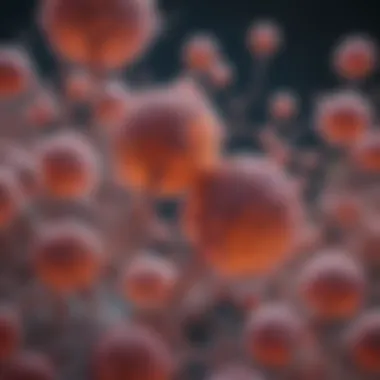Nobel Prize for Cancer Treatment: Insights and Innovations


Intro
Cancer has long been a formidable adversary in the medical field, often seen as a labyrinth of complexities both in its treatment and research. Over the years, significant advances have emerged, and some have been recognized with one of the highest honors in science – the Nobel Prize. The accolades awarded in the field of cancer treatment shine a spotlight on transformative research that not only changes clinical practices but also raises important discussions surrounding innovation in oncology.
The Nobel Prize is not just an award; it represents a cornerstone in understanding how groundbreaking developments influence cancer therapies. It emphasizes the role of rigorous study, unswerving dedication, and pioneering spirit that researchers embody. Amidst this backdrop of commendation and change, we delve into some of the most pivotal findings and the stories behind them.
Key Research Findings
Overview of Recent Discoveries
Cancer treatments have evolved at a breakneck pace, driven by relentless inquiries and discoveries. From immunotherapy, harnessing the body’s immune system to fight malignant cells, to targeted therapies designed for specific genetic mutations, numerous innovations are steeped in diligent exploration. Recent findings spotlight the role of CRISPR technology, a gene-editing marvel that opens a new world of possibilities in treating cancer at its molecular roots. Advances in personalized medicine are also worth noting, as they allow for tailored treatments based on individual genetic profiles.
Significance of Findings in the Field
The studies that have landed Nobel accolades often mark a shift in paradigm within cancer treatment. For instance, the introduction of immunomodulatory agents has showcased remarkable results in patient outcomes and has challenged the previous norms of treatment effectiveness. The implications extend beyond clinical success; they advocate for a broader understanding of biological intricacies that drive cancer progression and recurrence.
"The finest hour of the human spirit shines brightest when faced with the gravest challenges, as exemplified in the annals of cancer research."
Breakdown of Complex Concepts
Simplification of Advanced Theories
Understanding the scientific details behind these innovations can often feel like deciphering a complex code. Take the concept of cell signaling pathways, for instance. In simpler terms, these pathways serve as communication channels within cells, dictating how they grow, divide, or initiate apoptosis (programmed cell death). Miscommunication in these pathways can lead to unrestricted cancer growth, illustrating why these intricate networks are critical targets for new therapies.
Visual Aids and Infographics
Visual aids enhance comprehension, particularly in grasping advanced scientific theories. Infographics showcasing the stages of cancer treatment—such as diagnosis, intervention, and follow-up—can distill a lot of information into digestible chunks. Diagrams illustrating cellular processes, while also demonstrating treatment mechanisms, offer a clearer picture of how groundbreaking therapies operate at a microscopic level.
By drawing connections between Nobel Prize-winning discoveries and their clinical significance, we uncover the intricate web bridging research and practice. The pursuit of knowledge continues, promising not only hope for cancer patients but a robust dialogue about the evolving landscape of treatment methodologies. With this foundation laid out, it becomes essential to delve deeper into the contributions made by the laureates and how their findings shape today’s oncology practices.
Intro to the Nobel Prize in Cancer Treatment
The Nobel Prize, an esteemed accolade in the realm of science, has honored numerous breakthroughs throughout its history, yet its connection to cancer treatment holds a particular significance. Recognizing the relentless pursuit of knowledge and the dedication of researchers, this prize sheds light on the innovations that have reshaped our understanding and approach to oncology. In delving into the Nobel Prize's role within cancer treatment, one cannot overlook how it highlights critical advancements that have provided new hope to patients while inspiring further research in the field.
Historical Context of the Nobel Prize
Established by Alfred Nobel’s will in 1895, the Nobel Prizes have been awarded annually in various categories, including Physiology or Medicine. From its inception, the prizes have celebrated the achievements of individuals whose work has significantly impacted humanity. In the context of cancer treatment, the relevance of these awards can be traced back to pivotal moments in medical research. For instance, the attention drawn to discoveries in chemotherapy and radiation therapy emphasized their importance during the post-war era, a time rife with new challenges in health care. This historical backdrop not only portrays the evolution of cancer research but also illustrates the necessity of recognizing scientific contributions that stretch the boundaries of what’s possible.
Important aspects of this historical context include:
- The transformation of public awareness about cancer.
- Notable research timelines that correlate with prize announcements.
- The correlation of ongoing advancements leading to increased funding and interest in oncology.
Overview of Major Discoveries in Cancer Treatment
Among the critical highlights in the history of Nobel-winning cancer treatment discoveries, several stand out as particularly transformative. The development of targeted therapy, immunotherapy, and novel chemotherapeutic agents have fundamentally altered clinical practice. Each breakthrough not only provided a new avenue for combating cancer but also contributed to a deeper understanding of the disease's biology.
Here’s a rundown of some noteworthy advancements:
- Discovery of DNA repair mechanisms: This revelation underpinned genetic mutations associated with cancer, leading to therapies that aim to correct these errors.
- Immunotherapy advancements: Pioneering work in harnessing the immune system to fight cancer has generated a new class of agents that revolutionized treatment paradigms.
- Chronic myeloid leukemia management: The introduction of imatinib, recognized with the Nobel Prize, exemplified how targeted therapies can yield long-term survival results.
"The Nobel Prize serves as a vital barometer for gauging the progress in cancer research, reflecting not just accolades but the profound impact on patient care and outcomes."
In summary, these discoveries have shaped the landscape of cancer treatment and served as the foundation for ongoing research. The Nobel Prize highlights the significance of such innovations, creating a domino effect that bolsters further inquiry and potential breakthroughs.


The Role of Research in Advancing Cancer Therapies
Research plays a critical role in the fight against cancer, serving as the backbone for the development of effective therapies and treatments. Without continuous inquiry and exploration, the field of oncology would remain stagnant, leaving patients with limited options and a grim outlook. Scientific advancement hinges on rigorous experimentation, often leading to breakthroughs that not only shift paradigms but also save lives. From clinical trials to laboratory experiments, each step forward represents hope for patients battling this pervasive disease.
Key Research Areas in Cancer Treatment
Diving into the many facets of cancer research lends insight into how therapies evolve and improve. Some key areas that have emerged in recent years include:
- Genomics: Understanding the genetic makeup of tumors helps tailor treatments. This area of study examines mutations and variations in cancer cells, guiding personalized medicine.
- Immunology: The focus here lies on the body's immune system and how it can be trained to fight cancer. Researchers are exploring how immune checkpoints and cytokines can enhance immune responses against tumors.
- Microenvironment Studies: Tumors do not exist in isolation; they thrive in intricate environments. Analyzing how surrounding cells, blood vessels, and immune cells affect tumor growth is shedding light on new therapeutic targets.
The benefits of delving into these areas are immense. For instance, the discovery of specific genetic markers allows for quicker diagnostics, while work in immunotherapy provides groundbreaking options for patients who previously had little hope.
Innovative Approaches: Immunotherapy and Beyond
Immunotherapy has emerged as a game-changer in cancer treatment, representing a paradigm shift in how we approach the disease. Rather than relying solely on traditional methods like chemotherapy or radiation, this innovative approach harnesses the body's own immune system to combat cancer cells. Various forms include monoclonal antibodies, cancer vaccines, and CAR T-cell therapy. Each of these methods taps into unique mechanisms of action, aiming to boost the immune response to eliminate malignancies.
Nevertheless, immunotherapy isn’t without its challenges. Some patients might experience immune-related side effects, underscoring the importance of ongoing research to refine these therapies. Notably, scientists are investigating combination therapies that marry immunotherapeutic agents with conventional treatments, aiming for a more robust anti-tumor response.
Moreover, the landscape of cancer treatment continues to evolve beyond immunotherapy, with exploration into gene editing technologies like CRISPR and innovative combination therapies. Each step forward in research opens new doors, shifting the narrative in cancer care.
"Advancements in research not only pave the way for new treatments but also reshape how we perceive cancer itself, transitioning from a terminal diagnosis to a manageable condition."
In summary, the role of research in cancer therapy advancement is crucial. By continually exploring various approaches, researchers contribute significantly to patient outcomes, enhancing quality of life and providing hope for many. As new findings emerge, the pathways to effective cancer treatments grow, illustrating the profound connection between research efforts and real-world applications in oncology.
Nobel Laureates and Their Contributions
The significance of Nobel Laureates in cancer treatment cannot be overstated. Their groundbreaking research and discoveries have not only advanced the boundaries of oncology, but they have set standards that future research endeavors aspire to emulate. The complexity of cancer as a disease poses significant challenges, and it’s the contributions of these remarkable individuals that pave the way for new and novel approaches in understanding and treating cancer.
Over the years, several Nobel Laureates have made pivotal contributions that marked turning points in cancer treatment. These accomplishments are not just a culmination of years of hard work but also reflect a deep commitment to addressing one of humanity's most pressing health challenges. By recognizing their work, we not only honor their innovations but also synthesize insights that inform future research and practical applications in cancer therapy.
Profiles of Notable Nobel Laureates
When we think about individuals who have made significant strides in oncology, a few names inevitably rise to the surface. For instance, consider James P. Allison and Tasuku Honjo, who were awarded the Nobel Prize in Physiology or Medicine in 2018 for their work on immune checkpoint inhibitors. Their research facilitated the development of treatments that enhance the body’s immune system to fight cancer more effectively.
Another standout figure is Robert Weinberg, whose discoveries have been essential in understanding the molecular basis of cancer. His work laid the groundwork for targeted therapies that are now commonplace in cancer treatment protocols.
Some notable Laureates also include:
- Harold Pinter, recognized for his contributions to improving chemotherapy methods.
- Paul Ehrlich, who advanced the concept of targeted therapy far earlier than many of us might realize.
These individuals exemplify how relentless pursuit of knowledge can lead to indispensable advancements in treatment methodologies.
Impact of Their Research on Modern Oncology
The contributions of these Nobel Laureates have had a profound impact on contemporary oncology. By pushing the envelope of what was traditionally accepted, they have encouraged holistic approaches that consider the immune system's role in combating cancer. For instance, the establishment of immunotherapy as a legitimate treatment option has completely altered protocols and patient outcomes.
Moreover, their research has solidified the importance of multi-faceted treatment plans that combine surgical, chemotherapy, and radiation elements alongside new treatments, creating a more comprehensive methodology.
"The influence of Nobel-winning research on cancer treatment isn’t just statistical; it’s personal. It changes lives every day."
With a focus on targeted therapies, their findings have also led to a more precise form of treatment. Such therapies are tailored to individual patients based on genetic makeup, providing a more effective approach that was unheard of decades ago.
In summary, the work of Nobel Laureates not only shapes the scientific landscape but also directly influences clinical practices. Their contributions are invaluable, serving as a testament to the relentless quest for understanding and combating a disease that continues to challenge us all.
Cancer Treatment Innovations Recognized by the Nobel


Cancer treatment innovations recognized by the Nobel Prize have had profound implications for modern medicine. These accolades not only highlight major advancements in oncology but also encourage further research and exploration in cancer therapies. Each breakthrough reveals the intricate balance of science, human ingenuity, and the relentless fight against a disease that touches a vast number of lives.
The ingenuity of these innovations often translates to significant improvements in patient outcomes, increasing both survival rates and quality of life. Recognizing such innovations underscores their multifaceted benefits, which range from more effective targeting of cancer cells to reducing toxicity associated with traditional treatment modalities.
Breakthroughs in Chemotherapy and Radiotherapy
Chemotherapy and radiotherapy have long been cornerstones in the fight against cancer. Breakthroughs in these fields have transformed how physicians approach treatment planning. After all, some Nobel-recognized discoveries radically altered the very foundation of cancer care.
For instance, the work of scientists such as Paul Ehrlich in the early 20th century established the principles of targeted chemotherapy. He developed "magic bullet" theories, emphasizing that a drug could selectively target and destroy cancer cells while causing minimal damage to healthy tissues. This foundational understanding has led to developing newer generations of chemotherapeutics that aim for high specificity and lower side effects.
Radiotherapy, too, has evolved significantly. With advances in imaging technology and dosimetry, radiation can be administered with unparalleled precision. Nobel laureate Maria Skłodowska Curie’s research into radioactivity laid the groundwork. Her contributions allowed for a more nuanced application of radiation in tumors, which has saved countless lives.
"The developments in chemotherapy and radiotherapy have not only advanced individual treatments; they have also paved the path for combination therapies that exploit the strengths of each modality."
In recent years, the complementary use of these therapies has enjoyed growing attention. Combining chemotherapy with immunotherapy, for example, shows promise. The synergistic effects of stacking treatments can sometimes overcome resistance or reduce recurrences, offering patients a fighting chance.
The Rise of Targeted Therapies
As the understanding of cancer biology deepened, so too did our ability to tailor treatments based on the genetic makeup of tumors. Targeted therapies have transformed the landscape of cancer treatment, leading to a more personalized approach to care. These therapies focus on specific molecular targets that are associated with cancer progression.
Nobel recognitions in this area often stem from the identification of oncogenes and tumor suppressor genes. Discoveries like that of the BRAF mutation have led to targeted agents that specifically inhibit aberrant signaling pathways in malignant cells. This specificity can translate to higher efficacy and reduced toxicity, as treatments can be more precisely directed.
The rise of targeted therapies also shines a light on the importance of biomarker testing in oncology. As patients increasingly undergo genomic profiling, customized treatment plans become feasible, thus optimizing therapy effectiveness and minimizing unnecessary side effects. Innovations in this realm tap into the very essence of precision medicine, establishing a paradigm shift in how we treat cancer.
For a deeper dive into these topics, you may refer to these resources: Wikipedia on Cancer Treatment, Britannica on Radiotherapy, and Reddit discussions on Targeted Therapies.
Ethical Considerations in Cancer Research
The exploration of cancer treatment inevitably leads to a multitude of ethical considerations that play a vital role in guiding research and practice. This section underscores the necessity of addressing these ethical dimensions, particularly as the stakes are high when it comes to human lives. The intersection of innovation and ethics in cancer research is not merely a regulatory hurdle; it fundamentally shapes the future of therapies that could potentially save millions. Additionally, the reputations of researchers and institutions hinge upon their adherence to ethical standards, which influence public trust and investment in ongoing studies.
Balancing Innovation with Patient Welfare
As researchers delve into new and groundbreaking therapies, they face a labyrinth of ethical dilemmas. The very essence of innovation often calls for daring approaches that might bear risks. In the realm of cancer treatment, where patients’ lives are often hanging by a thread, this balancing act becomes paramount.
The crux of this dilemma lies in determining how far one can push the envelope in the name of science while ensuring that patient welfare remains at the forefront. Engaging in novel trials may open doors to cutting-edge treatments but may also expose participants to adverse effects they may not fully comprehend. The idea is to strike a delicate balance. Ethical guidelines serve as the compass here, emphasizing the need for informed consent, patient safety, and transparency.
Patients are often treated as partners in the research process, and providing them with clear information about potential risks and benefits is crucial. This empowers them to make informed decisions while ensuring their rights are respected. As we venture further into the 21st century, engaging patients in discussions surrounding clinical trials and giving them a voice in their treatment plans reflects a significant shift towards a more ethical approach to innovation.
Access and Equity in Cancer Treatment
Equity in cancer treatment refers to the fair distribution of resources and capabilities that allow all patients the opportunity to receive effective therapies. However, the reality often tells a different story. Disparities in access can result in considerable gaps in treatment outcomes among different demographics.
Many factors contribute to these disparities, including socioeconomic status, geographic location, and race. The ethical imperative is to scrutinize these inequities and advocate for a system that ensures fair access. Addressing these issues can take various forms:
- Policy Reform: Implementing regulations that minimize inequities in access to cancer treatment across different populations.
- Awareness Campaigns: Educating the public about available resources and preventative care, particularly in underprivileged communities.
- Funding Initiatives: Encouraging government and private funding to support research aimed at understanding and addressing these disparities.
Ultimately, addressing access and equity isn't just a matter of ethical duty; it fundamentally affects the outcomes of cancer treatment on a global scale.
The Future of Cancer Treatment Research
The landscape of cancer treatment is experiencing a seismic shift as new paradigms emerge. Understanding the future of cancer treatment research is critical because it shapes medical practices, influences patient outcomes, and redefines our understanding of cancer as a disease. Innovations are not merely a pursuit of science; they are essential avenues for enhancing the quality of life for those affected by cancer. This section emphasizes the pivotal trends, technologies, and treatments that will likely characterize the next phase of oncology.
Current Trends in Cancer Therapy Development


In the realm of cancer therapy development, several trends are bubbling to the surface, indicating a more personalized and targeted approach to treatment. Here are some notable trends:
- Precision Medicine: This approach tailors treatment to an individual’s unique genetic makeup, allowing for more effective interventions. Genetic sequencing is becoming a standard part of diagnosis and treatment plans; it uncovers specific mutations that can be targeted directly.
- Patient-Centric Care: There’s a growing emphasis on the involvement of patients in their treatment plans. Understanding patient preferences and outcomes has shifted the focus towards holistic approaches that consider psychological and lifestyle factors.
- Combination Therapies: Utilizing a blend of treatments—from immunotherapies to traditional chemotherapy—shows promise in improving efficacy and combating drug resistance. For instance, combining checkpoint inhibitors with chemotherapy is an area actively being explored.
- Tumor Microenvironment Research: Studies are increasingly recognizing the role of the tumor microenvironment in cancer progression. Research is delving into how surrounding tissues affect cancer growth and response to therapy, which could unlock new treatment strategies.
Such trends signal a deviation from one-size-fits-all approaches, indicating a future where therapy regimens are meticulously crafted based on comprehensive biological insights.
Emerging Technologies and Treatments
As we stride further into the future of cancer treatment, emerging technologies are poised to revolutionize the field. These innovations offer exciting possibilities:
- Artificial Intelligence (AI): Sophisticated algorithms are being developed to assist in diagnostics, treatment planning, and even predicting patient outcomes. AI systems can analyze medical images with remarkable accuracy, often surpassing human capabilities when it comes to spotting subtle changes in tumors.
- CRISPR and Gene Editing: The ability to edit genes opens unprecedented doors in cancer therapy. CRISPR technology can potentially target and correct mutations at the genetic level, representing a radical shift in how we approach cancer treatment.
- Nanotechnology: Utilizing nanoparticles to deliver drugs specifically to cancer cells minimizes damage to surrounding healthy tissues. This targeted delivery system may enhance the effectiveness of drugs while reducing side effects, a major hurdle in traditional therapies.
- Telemedicine: In the wake of the global pandemic, telemedicine has become more accepted and established. It expands access to oncologists, thereby providing remote diagnostics and treatment options that can help monitor patients’ conditions with greater efficacy.
The convergence of these technologies, along with patient-centered approaches, will likely yield breakthroughs that enhance not just survival rates but also the overall experience of patients undergoing cancer treatment.
"The future of cancer treatment research is not simply about prolonging life; it’s about improving the quality of life during and after treatment."
As new strategies and technologies develop, the focus will shift towards adaptable and integrative care pathways that reflect individual patient circumstances, ultimately aiming for a fundamental transformation in how we approach cancer care.
Global Impact of Nobel-Winning Cancer Treatments
The significance of the Nobel Prize in the realm of cancer treatment extends far beyond a simple accolade. It serves as a catalyst for change, promoting innovations that lead to successful therapies and progress in patient care. Over the years, the Nobel Prize has not only recognized individuals for their groundbreaking work but also spotlighted the broader implications of that research on therapeutic practices globally. One cannot understate how these acknowledgments have influenced health policies, patient access to treatments, and societal perceptions surrounding cancer care.
Influence on International Health Policy
The influence of Nobel-winning cancer treatments on international health policy is substantial. As new discoveries are awarded, countries often feel compelled to adapt their healthcare frameworks to incorporate the latest advancements. Policies that prioritize funding for research, equitable patient access, and global health initiatives often emerge in response to the groundbreaking nature of these treatments.
For instance, when researchers like James Allison and Tasuku Honjo were awarded the Nobel Prize for their contributions to immune checkpoint therapy, many nations recognized the need for proper implementation of such treatments within their healthcare systems. The following aspects are some of the notable impacts on health policy:
- Resource Allocation: Countries may reallocate funds to support further research initiatives or to enhance infrastructure around administering new therapies.
- Regulatory Changes: Health authorities might expedite approval processes for novel treatments, aiming to make them available to patients as quickly as possible.
- International Collaboration: Prize-winning research can serve as a rally point for nations to collaborate on cancer treatment research, sharing resources and insights that can lead to improved outcomes worldwide.
"The Nobel Prize serves not just as an accolade but as a beacon for future research and policy, guiding the course of cancer treatment on a global scale."
Public Perception of Cancer Treatments
Public perception of cancer treatments often shifts in tandem with the recognition attributed to Nobel-winning research. As the effectiveness of these treatments becomes more apparent, they generate greater trust and hope within communities battling cancer. However, this also includes a responsibility to manage expectations realistically.
The role of media in disseminating information about Nobel-laureate discoveries cannot be ignored. This influences how society views not just the effectiveness of treatments but also the complexities involved. The following points illustrate how the public perception evolves with breakthroughs in cancer treatments:
- Awareness and Education: Recognition of significant advancements leads to increased awareness about various treatment options available, which can empower patients to make informed decisions regarding their health.
- Trust in Science: When Nobel laureates are featured in the media, it fosters a sense of trust in medical science. Patients are more inclined to seek out treatments associated with recognized researchers.
- Social Stigma: As certain therapies become synonymous with success, the stigma surrounding cancer treatments diminishes. Patients are less likely to feel isolated as communities come to understand the efficacy of new therapies and the science that supports them.
In summary, the global impact of Nobel-winning cancer treatments is multifaceted, influencing not only how policies are sculpted internationally but also shaping how society views and responds to cancer care.
End: The Way Forward in Cancer Treatment
As we look ahead, it's clear that the landscape of cancer treatment is rapidly evolving. The journey taken by the Nobel Prize laureates has not only shaped how we understand and treat cancer but has also highlighted the continual need for innovative research. The impact of these advancements cannot be overstated. They provide hope and bring forth new treatments that could extend and improve the quality of life for cancer patients worldwide.
Summarizing the Importance of Ongoing Research
Research is the bedrock of progress in any scientific field, but it is especially crucial in oncology. The myriad of findings, from the mechanisms of cancer cell biology to the latest in targeted therapies, emphasizes that there is always more to uncover. Ongoing research helps in:
- Identifying New Treatments: Innovations in drug formulations, alongside immunotherapies, are continually developed to outsmart cancer's complex nature.
- Understanding Cancer Mechanisms: A deeper comprehension of how cancer develops aids in early detection and improves the effectiveness of existing treatments.
- Personalizing Medicine: More research allows for treatments to be tailored to the individual characteristics of each patient, leading to better outcomes.
Each of these points becomes more vital as cancer continues to affect millions.
Call to Action for Future Research
The future of cancer treatment undoubtedly hinges on continued support for research. Policymakers, institutions, and communities must join hands to foster a culture where scientific inquiry thrives. This can be achieved by:
- Increased Funding: Accessible funding for research initiatives is paramount to enable groundbreaking discoveries.
- Collaboration Across Disciplines: Interdisciplinary collaboration can spark new ideas that lead to revolutionary treatment approaches.
- Public Awareness and Participation: Engaging the public with education and research programs motivates more individuals to contribute to cancer research through various means, including clinical trials and funding.
As the saying goes, "Many hands make light work." Unified efforts can drive significant results in the fight against cancer, ensuring that future generations benefit from emergent therapies. The call for action is loud and clear: sustained investment in research is essential to turn the tide against cancer.















